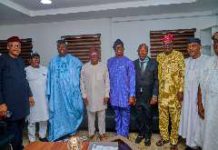The Head of Programmes, Justice, Development and Peace Caritas-JDPC, a Faith-Based Non-Governmental Organization, Mr. Emmanuel Sunday Tagwai, has described literacy as an agency for the mainstream of education.
Mr. Tagwai stated this in an interview with Report Circle Correspondent in Kaduna State, North-West, Nigeria on Friday as he join Nigeria with other Nations to commemorate the International Literacy Day, celebrated on the Eight of September every year with the theme: “International Literacy Day: “Literacy in a Digital World” which was proclaimed by the United Nations Educational, Scientific and Cultural Organization-UNESCO on November 17, 1965.
Justice, Development and Peace/Caritas Advocates (JDPCA) is a structural response to the Second Vatican Council (1962-5) appealing for the church’s involvement in the building of a just and peaceful world. The purpose of this organization is to co-ordinate the activities geared toward a positive change in the human condition, such as poverty, religious bigotry, election malpractices, diseases and injustice.
Quoting UNESCO, Mr. Emmanuel Tagwai, said about 775 million adults lack minimum literacy skills, one in five adults is still not literate and two-thirds of them are women while 60.7 million children are out-of-school and many more attend irregularly or drop out.
Mr. Tagwai added that also the 2015 UNESCO survey revealed that 65 million of Nigerians are illiterates which could jeopardize government’s efforts at removing millions of Nigerians from poverty.
He was of the opinion that the Northern part of Nigeria has the high rate of illiteracy based on research, evidence, studies including low level of literacy, saying with the celebration of the Day across the global, the UNESCO fixed this day to look at what countries can do globally, locally and internationally in combating illiteracy so that people who are disadvantaged in different ways will have the opportunity to be learned.
“An earlier survey in 2010 conducted by the Nigerian Bureau of Statistics put the literacy level in Borno State at 14.5 percent as the lowest, Edo State at 45.8 per cent, with adult literacy rate at 56.9 per cent shile the highest is Lagos at 92.0 per cent.
“The UNESCO’s 2006 “Global Monitoring Report on Education for All, Countries with the lowest literacy rates in the world are Burkina Faso with 12.8%, Niger (14.4%) and Mali (19%) while South and West Asia has the lowest regional adult literacy rate with 58.6%, followed by sub-Saharan Africa 59.7%, and the Arab States 62.7%.
The Head of Programme attribute factors responsible for illiteracy in the north to poverty, culture and religious norms which have impute on the issues of literacy because people feel that if they have culture and religion they have knowledge.
He continued to mention that the benefit of literacy country is an advance country and developed country, saying a literacy country are going to the moon, making discoveries, growth, economic power, social cultural development but the opposite is the case to any country that is not illiterate.
Mr. Tagwai however informed that those who are teachers, policymakers in education in Nigeria at local level and national even globally need to weak up to the call to say that Nigeria policies must be tailored towards seeing that there are deliberate polices that support the issue of combating illiteracy.
“The impact of been an illiterate country or individual cannot over emphasized, lamenting that in this view the key stakeholders in Nigeria and other nations need to do a lot in terms of shaping the skills and knowledge of those who teach and develop the human person.
“They should ensure the policies reduce illiteracy so that everyone will be educated and knowledgeable and given the opportunity and access to education, to be learned, be comparative of the issues of other people, countries and of region because this is why the UNESCO reminded the international community of the status of literacy and adult learning globally.
















